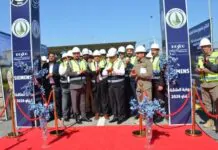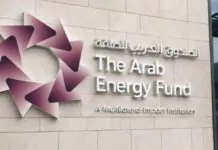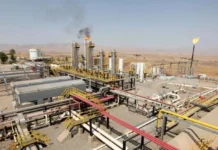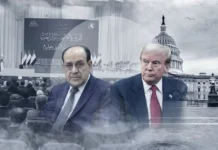Tishwash: Parliamentary meeting with the Governor of the Central Bank and officials from the Ministry of Finance
The Parliamentary Finance Committee held a closed meeting today, Tuesday, with the Governor of the Central Bank, Ali Al-Alaq, the directors of Rafidain Bank and the Trade Bank of Iraq (TBI), the Director of the Anti-Money Laundering Department at the Ministry of Finance, and other officials, to discuss the file of financial sanctions on some banks. / link
Tishwash: A burning economic debate.. Is raising the exchange rate the magic solution for the Iraqi economy?
An ongoing debate among economists in Iraq about the effects of adjusting the exchange rate of the Iraqi dinar against the US dollar on the national economy, especially in the fields of agriculture and industry.
The opinions of experts and officials vary between supporters and opponents of changing the exchange rate, with a focus on how this will affect the productive sectors and the overall economy.
In 2020, the Central Bank of Iraq decided to adjust the exchange rate of the dollar against the dinar, as the purchase price of the dollar from the Ministry of Finance reached 1,450 dinars, while its selling price to banks was set at 1,460 dinars, and to citizens at 1,470 dinars per dollar.
In February 2023, the Central Bank of Iraq announced another adjustment in the exchange rate, to become 1,300 dinars per dollar, as the decision came in an attempt to control inflation and achieve stability in the general price level.
Protecting the Iraqi Dinar
In turn, economic expert Alaa Al-Fahd believes that “the current exchange rate represents a balance that protects the value of the Iraqi Dinar and maintains the general price level, which helps protect the poor classes.”
“The main reason behind the rise in production costs is due to the rise in energy prices, not the exchange rate,” he told Iraq Observer.
“The real problem that hinders the rise of productive sectors, especially agriculture and industry, is related to the energy crisis, especially electricity, as this crisis leads to higher production costs, which prevents the development of these sectors,” Al-Fahd added, noting that “countries like China have a low exchange rate for their currency, and despite that, their industry is thriving, which means that the decline in the currency may be an opportunity for the growth of local production, and not necessarily an obstacle to development.”
Historically, the Iraqi dinar has witnessed fluctuations in its value. In 1980, the dinar was equivalent to 3.3 US dollars, but its value deteriorated during the Iran-Iraq war, falling to about 4 dinars to the dollar in 1988. After the invasion of Kuwait and the imposition of an economic blockade in the 1990s, the value of the dinar deteriorated significantly, reaching about 3,000 dinars to the dollar in 1995.
Raise the exchange rate
On the other hand, Deputy Governor of the Central Bank of Iraq, Ihsan Shamran, believes that “industry will not rise unless the state finds itself in it, and neither will agriculture unless the exchange rate is changed, as the current rate is unfair, and the Iraqi exporter sells goods at any price and makes a profit because the dollar is very cheap.”
Shamran added in a press statement that “the cheap dollar is pushing some exporters to sell any commodity inside Iraq in exchange for the dollar, as the exchange rate should be between 2,000-2,500 dinars per dollar, considering that the Iraqi currency is very strong due to its high balance.”
He pointed out that “Iraq has reserves of nearly 120 billion dollars against a trading source estimated at 103-104 trillion dinars, which gives the Iraqi currency a cover of nearly 170%, which is not a small matter, but the relationship with the dollar requires adjusting the exchange rate to achieve the required balance.”
Experts have differed on the impact of these amendments on the Iraqi economy. While some believe that devaluing the dinar enhances the competitiveness of local products and reduces the budget deficit, others believe that it leads to higher living costs and negatively affects low-income groups.
Economists believe that the real problem lies in the structure of the Iraqi economy and its heavy dependence on oil, in addition to challenges related to energy and infrastructure, which hinder the development of other productive sectors. link
************
Tishwash: British Ambassador: Our view on Iraq has been fixed for 30 years, but now it has changed for the better
The British Ambassador to Iraq, Stephen Charles Hitchcock, confirmed today, Monday, that Iraq is a country of opportunities and investments, while expressing his optimism about the future of Iraq, due to the creativity, courage, dignity and endurance of the Iraqi people .
Hitchen said in a speech during the economic conference of the Iraqi-British Business Council, “My mission will end in two weeks, and it is natural for us to start thinking about what conclusions we can offer, and I share with you several ideas after a beautiful experience with you in Iraq. I am optimistic about the future of your country, and the source of optimism is the creativity, courage, dignity and endurance of the Iraqi people .”
He added, “Despite the challenges and problems, you can see that the trend towards the future is more positive in the current year 2025, and this is better than the situation in 2020, which was better than 2015, which was better than 2007, and the trend towards the future is clear and the existence of challenges cannot be ignored or denied, and you know the size of the challenges ahead of you .”
He continued, “For 30 years, British ministers viewed Iraq as a country of crises, a dangerous region and a security challenge. Now, for the first time, we have changed our ideas and see Iraq as a country of opportunities and investments,” indicating, “The presence of our embassy in Iraq is not because of the past, but because of the future, and this is a turning point in our ideas .”
He explained, “The Iraqi government is responsive to our ideas and we have a contact group for the Iraqi economy which includes the G7 and the World Bank,” explaining, “We spoke with government advisors with the aim of unifying economic ideas .”
He added, “Prime Minister Mohammed Shia al-Sudani’s recent visit to London was to renew trade relations and announce projects worth 12 billion pounds sterling, and we have coordination and cooperation with the Prime Minister’s Office to implement these projects in the coming period .”
Hitchen concluded by saying, “The most important existential challenge is not ISIS or regional problems, but the demographic and economic situation before you. We expect, over the next 15 years, a decline in the price of oil and an increase in the population, as in 2003 there were 23 million people, now there are 46 million people, and in 2040 the number will reach 70 million people, and this is a big challenge link






